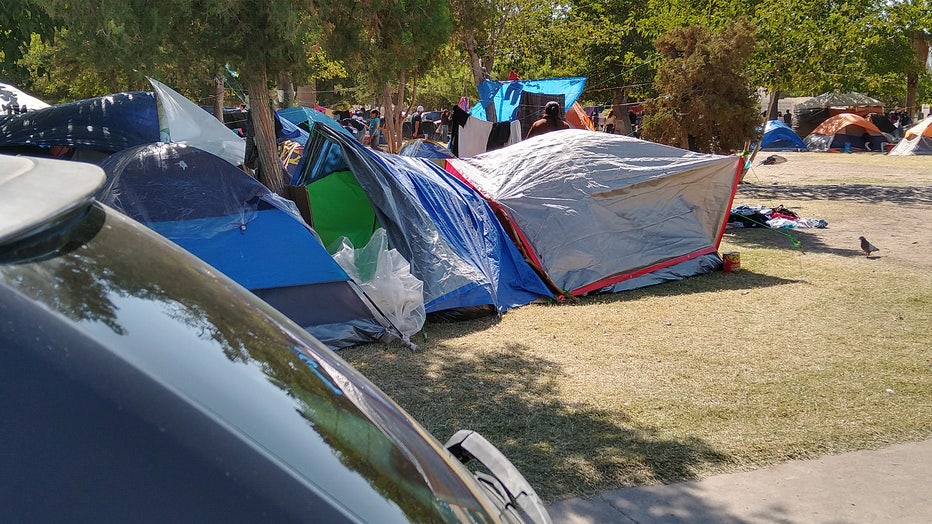New migrant tent city takes shape just south of US port of entry
JUAREZ, Mexico (Border Report) — A new migrant tent city is going up in Juarez’s Chamizal Park, as families fleeing drug violence make their way from the interior of Mexico to request asylum in the United States.
More than 3,500 men, women, and children from Zacatecas, Michoacan, Guerrero, Jalisco and other states in West-Central Mexico have arrived in Juarez since September and occupied public spaces just south of the border near three U.S. ports of entry in El Paso, Texas, said Mexican Labor Undersecretary Horacio Duarte.
The adults say they left their communities after relatives or friends were killed, robbed or abducted by criminals. However, they’re reluctant — out of mistrust — to let Mexican authorities assist them, Duarte said.
Only 110 of the 3,500 Mexican migrants near the Americas, Paso del Norte and Zaragoza ports of entry have accepted invitations to stay at a shelter the federal government built in Juarez for Central Americans and other foreigners.
“We are dealing with a changing migration dynamic,” said Duarte, who is the acting Immigration Commissioner for the Northern Border in the Lopez Obrador administration. “Whereas a few months ago it was Cubans and Central Americans coming in large numbers in the hope of obtaining asylum in the United States, now we are seeing a large number of Mexican (citizens) come.”
The migrants hail from states and towns where drug cartels are at war with each other or trying to expand their influence.
In some cases, small business owners are told to sell drugs on their premises or face reprisals. In others, young men are being recruited to sell drugs or become cartel enforcers.
A few heads of households interviewed on Thursday at the Chamizal Park said they no longer feel safe in their communities and don’t trust the government because they feel Mexican authorities are in the pocket of the drug cartels.
“People go missing in our town all the time. My husband and I don’t want to raise our children there. Something bad could happen at any time,” said Elvira Gallegos, as she washed her children’s clothes at the park in a plastic bucket.
Gallegos declined to identify her town or do a full interview on camera. She said she came to Juarez three weeks ago on a bus along with two other families after criminals abducted one of their neighbors.
“There’s 12 of us; three families with all of our children,” she said.
Maria Elena Gonzalez, 25, her husband and two children have been living under a small green canvass tent at the park for the last two weeks. She hasn’t had any contact with U.S. immigration authorities yet, but she’s hopeful they will eventually hear her case and grant her family asylum.
“There are shootings and murders, really horrible things taking place all around us. We live in complete insecurity,” she said. On Thursday, she wore a light jacket that she got in Juarez. “I didn’t think it would be this cold, the weather is different. I hope it doesn’t get a lot colder,” said the native of Morelia, Michoacan. That Western state saw a spike in violence this summer, culminating with the Aug. 8 massacre of nine people whose bodies were hung from bridges in the city of Uruapan.

The migrants’ tents are starting to take over the Chamizal Park in Juarez, Mexico. (photo by Julian Resendiz/Border Report)
Nobody appeared to be in charge of the new migrant tent city at the Chamizal. However, families interviewed mentioned that a waiting list was being kept among them for appointments with U.S. Customs and Border Protection in El Paso. None of the migrants would tell BorderReport.com who had the list and they appeared coached not to talk to reporters or allow photographs.
Duarte said the Mexican migrants pose a legal challenge to the federal government because they’re entitled to freedom of movement.
“We cannot force them out, we cannot repress them. All we can do is invite them to stay at the shelter, but they’re reluctant to move because they think they’ll lose their place in line,” he said.
The Labor Undersecretary said president Andres Manuel Lopez Obrador is considering increasing federal aid to the states the migrants are fleeing or, in a worst-case scenario, route the displaced families to safe zones where local authorities would be able to provide jobs and protection.
“We need to sit down with the state governments so their people can have alternatives to coming to the border. … There could be other regions within their states or other states in the country where they can resettle … so they do not add to the challenges the migrant flow has brought to the border”, the Labor Undersecretary said.
He added that foreign-owned assembly plants known as maquiladoras are looking for workers in the states of Queretaro, Guanajuato, and Jalisco.
Duarte said Mexico was able to reduce the flow of migrants from Central America through a combination of border enforcement and a pledge of $95 million in aid to Guatemala, Honduras, and El Salvador. He said a similar strategy could work in the case of displaced Mexican citizens.
On the one hand, the public safety situation has to be addressed. On the other, “we need policies of support to states where the migration is originating from. We need to invest in these regions so they can create conditions so their people don’t leave,” he said.

